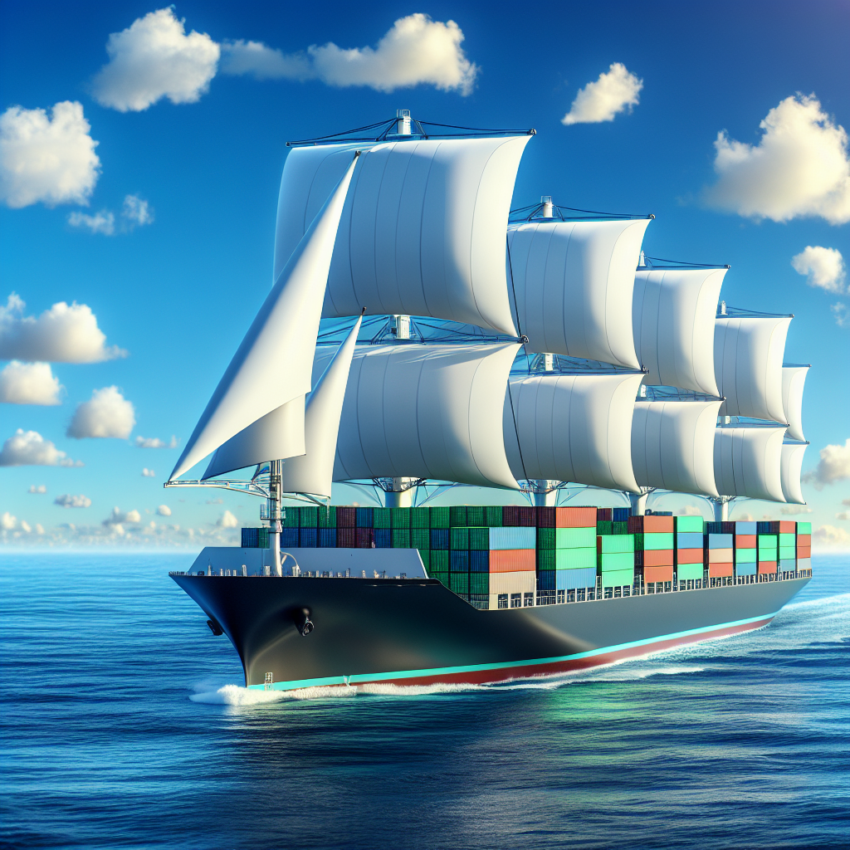
The global trade winds are shifting, and along with them, the container shipping industry is making a pivotal turn toward sustainable practices. With our oceans busier than ever, the towering stacks of containers on massive vessels have become the symbols of international trade. However, the environmental toll of this bustling industry has ignited a call for greener maritime practices, from the drawing boards of eco-friendly vessel designs to the energetic discussions on alternative fuels.
Eco-conscious vessel design a crucial response to the need for cutting emissions and protecting marine ecosystems. Naval architects are no longer focusing solely on the size and capacity of the ships but are also integrating advanced materials and technologies to reduce the carbon footprint of these gargantuan floating cities.
Streamlined Hulls and Propulsion Efficiency
One of the quiet revolutions happening below the waterline is the redesign of ship hulls. Streamlined hulls with improved hydrodynamics ensure that the vessels cut through the waves more efficiently, thereby reducing fuel consumption. Additionally, propeller and rudder technologies have undergone a metamorphosis, incorporating systems like the Mewis Duct or Becker rudder, which further optimize water flow and propulsion.
Waste Heat Recovery Systems
The incorporation of waste heat recovery systems stands out as a noteworthy feature. These systems demonstrate an innovative approach by capturing heat from engine exhaust and converting it into electricity for onboard consumption. By doing so, these systems not only contribute to enhancing energy efficiency but also alleviate the demand on primary engines, resulting in a reduction in overall fuel consumption.
The utilization of waste heat recovery systems aligns with the maritime industry’s growing commitment to environmentally friendly practices. This technology helps decrease greenhouse gas emissions associated with traditional marine propulsion systems. As regulatory bodies increasingly focus on reducing the environmental impact of shipping activities, the adoption of waste heat recovery systems becomes a significant step toward achieving sustainability goals in the maritime sector.
Ballast Water Management
Ballast Water Management is crucial in preventing the invasion of non-native marine species, which can lead to severe ecological disruptions. Improper handling of ballast water poses a significant threat, as vessels may inadvertently transport various organisms across different ecosystems. The integration of advanced ballast water treatment systems in modern ship designs addresses this issue effectively.
These treatment systems play a pivotal role in purifying ballast water before its release into new environments. By eliminating or neutralizing harmful organisms and pathogens, these technologies help safeguard marine ecosystems from potential damage caused by invasive species. The implementation of stringent regulations and international standards further reinforces the importance of proper ballast water management.
Eco-Friendly Power Sources
As the world seeks to break its reliance on fossil fuels, the container shipping industry is exploring alternative energy sources to power its fleet. These alternatives range from biodiesel to liquefied natural gas (LNG), and some companies are even experimenting with harnessing wind and solar power.
LNG: A Stepping Stone in Maritime Energy Transition
Liquefied Natural Gas (LNG) plays a pivotal role as a transitional fuel in the maritime industry’s energy transition. It serves as a cleaner alternative for container ships, significantly reducing sulfur oxide and particulate matter emissions compared to traditional fuels. The increasing prevalence of LNG-powered vessels is indicative of the industry’s proactive response to environmental concerns.
Container shipping companies are increasingly investing in dual-fuel engines, allowing seamless switching between LNG and conventional bunker fuel. This adaptability helps navigate both regulatory requirements and potential challenges in the LNG supply chain.
The adoption of LNG represents a strategic move in balancing environmental stewardship with operational efficiency. By embracing LNG technology, the maritime sector demonstrates a commitment to reducing its ecological impact and aligning with global efforts for a cleaner and more sustainable future in maritime energy use.
Biofuels
Next on the horizon are biofuels, which are derived from renewable sources like vegetable oils or waste materials. These fuels can significantly reduce emissions and often require minimal changes to existing engine designs. Trials are underway to determine the long-term viability and scalability of biofuels in the shipping industry.
Sails and Solar
The vision of modern vessels augmented with sails harnessing wind power is becoming a reality. Innovative sail systems like the Flettner rotor and soft-sail technology are being tested to provide supplemental power to ships, substantially reducing fuel consumption. Moreover, solar panels are now being installed on some vessels to power onboard operations and decrease the dependency on diesel generators.
Optimizing Logistics and Infrastructure
Sustainability within container shipping is encompasses the logistical operations at ports and the supporting infrastructure.
Ports around the world are investing in electrification, enabling ships to shut down their engines and plug into shore-side electrical power. Smart logistics software helps in optimizing docking and handling operations to minimize idle time and emissions.
Intermodal transportation, which involves the seamless movement of containers using multiple modes of transport without handling the cargo itself, plays a vital role in lowering emissions. By efficiently integrating rail, truck, and sea transport, the environmental impact of moving goods is significantly reduced.
A ship is only as efficient as its crew, and as new technologies emerge, ongoing training and education become increasingly important. Crew members need to be well-versed in operating cutting-edge systems and understanding the best practices for reducing emissions and energy consumption.
Research, Investment, and Collaboration
Sailing into a sustainable future is a complex challenge that requires collaboration across the industry. Research and development are essential in pioneering new materials, designs, and energy alternatives. Investment from stakeholders at all levels will ensure that the container shipping sector continues to innovate and improve.
Ongoing research in fields such as advanced battery technology, hydrogen fuel cells, and energy-efficient ship operations is paving the way for the next generation of green shipping solutions. By investing in research, the industry can find the most effective and practical ways to reduce its environmental impact.
Industry-Wide Commitment
The container shipping sector requires a collective commitment from various stakeholders, including shipping companies and port authorities, to bring about positive change. Collaboration is essential to address the environmental impact of the industry effectively. Several initiatives and organizations, such as the International Maritime Organization (IMO), are actively engaged in promoting cooperative efforts to achieve a more sustainable future for shipping.
The IMO has set a significant target, aiming to reduce greenhouse gas emissions from shipping by 50% by the year 2050. This ambitious goal underscores the industry’s acknowledgment of its environmental responsibilities and the urgency to adopt cleaner practices. The commitment to such initiatives reflects a shared understanding among industry participants that concerted action is necessary to mitigate the environmental footprint of container shipping.
As various entities align their strategies with these goals, the industry moves to a more environmentally conscious and responsible future, demonstrating the collective dedication required to navigate to sustainable practices in container shipping.
The Ripple Effect and Why It Matters
The benefits of sustainable container shipping extend beyond the oceans. By reducing emissions and fuel consumption, we’re contributing to global efforts against climate change. Eco-friendly shipping practices ensure that the industry can continue to support global trade while preserving the planet for future generations.
The container shipping industry sits at a crossroads, with one path leading to a more sustainable and environmentally responsible future. Through innovative vessel designs, alternative fuels, and smarter logistics, this path is necessary. As consumers and businesses become increasingly aware of their environmental footprint, the demand for cleaner shipping will only grow stronger.
Armed with the resolve to navigate these eco-conscious waters, the shipping industry is setting sail towards a greener horizon. Embracing these changes doesn’t only ensure compliance with stricter environmental regulations, it also symbolizes a commitment to protecting our blue planet while keeping the wheels of global commerce turning—sustainably, responsibly, and efficiently.


